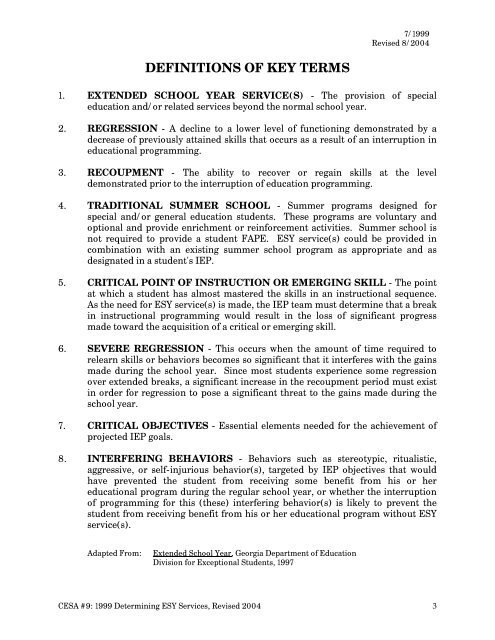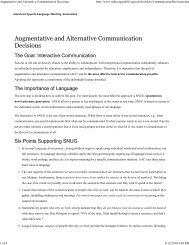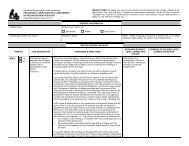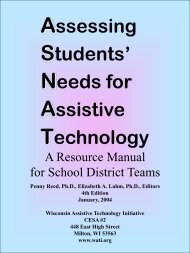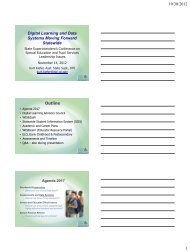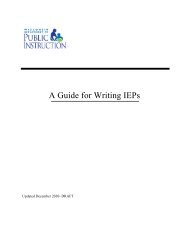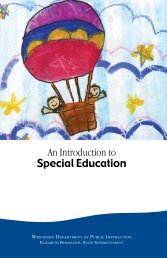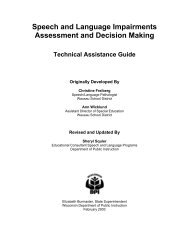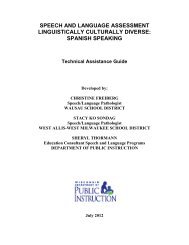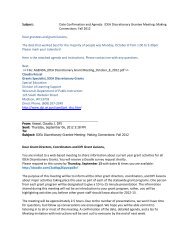Extended School Year Services (ESY) - The Special Education Team
Extended School Year Services (ESY) - The Special Education Team
Extended School Year Services (ESY) - The Special Education Team
Create successful ePaper yourself
Turn your PDF publications into a flip-book with our unique Google optimized e-Paper software.
DEFINITIONS OF KEY TERMS<br />
7/1999<br />
Revised 8/2004<br />
1. EXTENDED SCHOOL YEAR SERVICE(S) - <strong>The</strong> provision of special<br />
education and/or related services beyond the normal school year.<br />
2. REGRESSION - A decline to a lower level of functioning demonstrated by a<br />
decrease of previously attained skills that occurs as a result of an interruption in<br />
educational programming.<br />
3. RECOUPMENT - <strong>The</strong> ability to recover or regain skills at the level<br />
demonstrated prior to the interruption of education programming.<br />
4. TRADITIONAL SUMMER SCHOOL - Summer programs designed for<br />
special and/or general education students. <strong>The</strong>se programs are voluntary and<br />
optional and provide enrichment or reinforcement activities. Summer school is<br />
not required to provide a student FAPE. <strong>ESY</strong> service(s) could be provided in<br />
combination with an existing summer school program as appropriate and as<br />
designated in a student's IEP.<br />
5. CRITICAL POINT OF INSTRUCTION OR EMERGING SKILL - <strong>The</strong> point<br />
at which a student has almost mastered the skills in an instructional sequence.<br />
As the need for <strong>ESY</strong> service(s) is made, the IEP team must determine that a break<br />
in instructional programming would result in the loss of significant progress<br />
made toward the acquisition of a critical or emerging skill.<br />
6. SEVERE REGRESSION - This occurs when the amount of time required to<br />
relearn skills or behaviors becomes so significant that it interferes with the gains<br />
made during the school year. Since most students experience some regression<br />
over extended breaks, a significant increase in the recoupment period must exist<br />
in order for regression to pose a significant threat to the gains made during the<br />
school year.<br />
7. CRITICAL OBJECTIVES - Essential elements needed for the achievement of<br />
projected IEP goals.<br />
8. INTERFERING BEHAVIORS - Behaviors such as stereotypic, ritualistic,<br />
aggressive, or self-injurious behavior(s), targeted by IEP objectives that would<br />
have prevented the student from receiving some benefit from his or her<br />
educational program during the regular school year, or whether the interruption<br />
of programming for this (these) interfering behavior(s) is likely to prevent the<br />
student from receiving benefit from his or her educational program without <strong>ESY</strong><br />
service(s).<br />
Adapted From: <strong>Extended</strong> <strong>School</strong> <strong>Year</strong>, Georgia Department of <strong>Education</strong><br />
Division for Exceptional Students, 1997<br />
CESA #9: 1999 Determining <strong>ESY</strong> <strong>Services</strong>, Revised 2004 3


